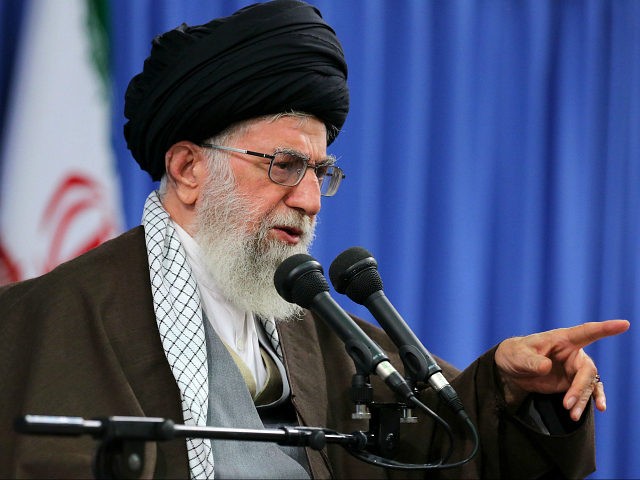Supreme Leader of Iran Ayatollah Ali Khamenei announced on Tuesday that he would cancel his annual New Year speech in the northern city of Mashhad to avoid exposure to Chinese coronavirus.
The coronavirus outbreak that originated in central Wuhan, China, has spread rapidly in Iran, killing nearly 300 people out of over 8,000 confirmed cases, according to the Iranian government. Iranian dissidents and reports from within the nation’s healthcare system suggest the official numbers are significantly lower than the true number of cases, kept artificially low by insufficient testing of both living patients and recently diseased who appeared to exhibit coronavirus symptoms. Iran has not identified the person who brought the virus into the country from abroad, making containing the virus significantly more difficult.
The Chinese coronavirus, like many other viruses in that family, causes respiratory infection. In severe cases, people infected with the virus develop pneumonia, struggle to breathe, and eventually die.
At age 80, Khamenei is at high risk for death if he contracts the coronavirus. The virus appears to cause more severe complications in the elderly and people with chronic disorders such as immunological diseases or diabetes.
“Imam Khamenei’s speech, which he has every year on the first day of the New Year in the holy shrine of Imam Reza (pbuh), will not take place this year due to health recommendations to prevent the spread of the Coronavirus. And, his Eminence will not travel to Mashhad,” Khamenei’s office said in an official statement Tuesday. “It is hoped that by fully observing the health guidelines and by relying on the Almighty God, our beloved people will soon have complete health. We also ask God the Almighty to heal and bestow health on those suffering from this disease.”
The Iranian Islamic regime has lost several powerful politicians, including an adviser close to Khamenei, to the ongoing viral outbreak. Hossein Sheikholeslam, a former ambassador to Syria who participated in the 1979 siege of the American embassy in Tehran, died last week, according to Iranian media. Intelligence officer Mohammed Haj Abolghasemi also died last week after testing positive for the virus. In addition to Abolghasemi, two other members of the Islamic Revolutionary Guard Corps (IRGC), a U.S.-designated terrorist organization, have died since the outbreak began.
The IRGC claimed last week that it is working to develop a vaccine against the Wuhan coronavirus, a bizarre claim giving that it is a terrorist organization. Iran also claims it is developing domestic solutions to handling the crisis, such as homemade testing kits and “herbal” treatments for the virus.
Iran has confirmed that at least 23 members of its Parliament also tested positive for the virus. At least two have died. Among those still alive confirmed to carry the virus are one of Iran’s vice presidents and the health official initially appointed to head coronavirus response, Iraj Harirchi.
Iranian officials have repeatedly speculated in public that the virus is an artificially created bioweapon, deployed to take down both Iran and China. While some Iranian officials have limited their theories to the virus being developed by an unnamed “hostile state,” others have concluded that “Zionists,” presumably the government of Israel, developed the virus to destroy the Islamic regime. Israel has not escaped the outbreak, documenting 58 cases and grounding international flights.
While Iranian officials have now begun the process of isolating potential coronavirus carriers within the highest levels of government, as recently as last week, Khamenei said in a speech that he was not overly concerned about the outbreak.
“In my opinion, this is not a very grave calamity and there have been graver ones. I myself have witnessed instances of these calamities,” Khamenei said, claiming that people “can eliminate many problems by praying, by supplicating, by relying on the immaculate Imams (greetings be upon them) and asking them to intercede on their behalf and by referring to the Holy Prophet of Islam.”
Khamenei thanked the nation’s medical workers for being “truly engaged in a jihad” against the virus.
“Of course, I do not want to understate its importance, but we should not exaggerate it either. An incident has taken place which will last for some time – but by Allah’s favor, it will not be very long,” Khamenei concluded at the time. “It will exist in the country for some time and it will disappear after a while.”

COMMENTS
Please let us know if you're having issues with commenting.